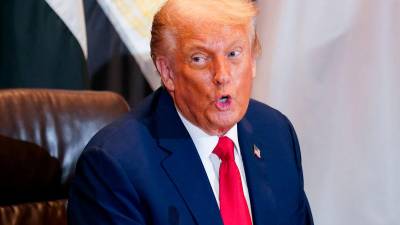IT is not often that we have all the camps in the British media united in celebrating the visit of a political leader from another country.
However, this happened with the right, left and centre of the English press world waxing rhapsodic over the second state visit of President Donald Trump and his wife, Melania.
The same was apparent with the American media, especially going gaga over the presence of British royalty during the visit. Greeted with a ceremonial welcome by King Charles and Prince William, he was hosted at a banquet in which Trump and Charles reaffirmed the special relationship between their two countries, exchanging extravagant and exaggerated praise for each other’s roles in global politics – past, present and future.
British media todying
The emphasis of tabloid and “yellow journalism” media covering the visit was about who was on the banquet guest list and the dinner menu, the dresses worn by Melania and royalty, the tiaras on display and other trivia, ad infinitum.
Special attention was given by the British Broadcasting Corporation to the wines and other alcoholic drinks served and how their “dating” related to special years in Trump’s life history.
Although Britain has long ceased to be a leading model in many areas of the modern world, the official and media adulation of Trump reveals that the UK flag still flies high in government and public displays of sycophantic pageantry, complete with cringe-worthy attempts to flatter special visitors.
Starmer’s agenda uncovered
Two objectives – one economic and the second geopolitical – were foremost in this case study of ingratiation and grovelling passed off as a diplomatic triumph by Prime Minister Keith Starmer’s Labour government.
Analysts have noted that the UK economy has been in crisis with the convergence of weak per-capita growth, chronic low productivity, consumer pessimism and falling international competitiveness.
Together, they point to a fundamental and potentially entrenched problem of economic stagnation and long-term decline in real living standards. Hence, it is not surprising to see the English media trumpeting Starmer’s “biggest coup” from the visit – £150 billion (RM852 billion) worth of investment from US companies – dubbed the “Tech Prosperity Deal”, the description borrowed from Trump’s favourite verbiage in describing his achievements.
The government, desperate for good economic news before the November budget, claims the investment will create some 7,600 jobs.
Former deputy prime minister Nick Clegg provided a different perspective, saying that the relationship between the UK and the US tech sector was “all one-way traffic” and that the announcements suited the companies.
He warned that Britain was being “defanged” by simply fostering a greater reliance on the US tech sector, rather than building its own. “These companies need those infrastructure resources anyway. They’re building data centres all over the world. Maybe they were pushed a bit forward just to meet the timetable with this week’s state visit. But it’s all one-way traffic.”
He also noted: “We’re a kind of vassal state technologically. The moment our tech companies start developing any scale or ambition, they have to go to California because we don’t have the growth capital here.
Meta’s former president of global affairs’ conclusion on the visit’s economic highlight: “In a sense, this US-UK tech deal is just another version of the UK holding onto Uncle Sam’s coat-tails.”
Coat-tails holding for lucrative military contract deals was also displayed for the world to see when King Charles, in his banquet speech, noted that the alliance between the UK and US was the “closest defence, security and intelligence relationship ever known”.
On this, he made a reference to the importance of the trilateral Aukus pact, which has implications for the Indo-Pacific region, far distant from Europe, where the UK should be focused on for its defence concerns.
Charles claimed that the Aukus submarine partnership, with the US and Australia, had set the benchmark for innovative and vital collaboration. What he omitted mentioning is that the earnings for British defence companies from the Aukus project are projected to be very significant.
A direct, single-number estimate is not publicly available and is difficult to calculate because the project spans decades. Credible estimates and the scale of work suggest British industry is poised to earn tens of billions of pounds over the 30-plus-year lifespan of the programme. The earnings are expected to come from several key pillars of the Aukus agreement, which is more than just submarines but also includes advanced technologies.
For political parties across the spectrum and the defence industry in the UK, the hope is that Aukus represents more than just a contract. They envision it as a generational guarantee of jobs, investment and technological relevance – securing Britain’s place at the top table of global arms exporters alongside the United States for the next 50 years.
This ambition helps explain the earlier behind-the-scenes manoeuvring – described by the French as treacherous – carried out by Boris Johnson’s government to undermine and ultimately sink Australia’s agreement to purchase French-built submarines.
Aukus reflects not only the murky and often unscrupulous nature of the global arms trade but also underscores a lingering “Cold War mentality” that risks sparking an arms race in the Indo-Pacific – destabilising the region and undermining prospects for peace.
Latest iteration of the colonial mindset
Britain’s colonial and post-colonial history played a significant role in shaping global power dynamics and stereotypes that continue to fuel inequalities, injustices and conflicts around the world today.
This latest phase reflects British ambition to piggyback on American dominance to advance the British place in an evolving global order, strengthen its technological and military base, and enhance its influence among key allies.
Lim Teck Ghee‘s Another Take is aimed at demystifying social orthodoxy.
Comments: letters@thesundaily.com
